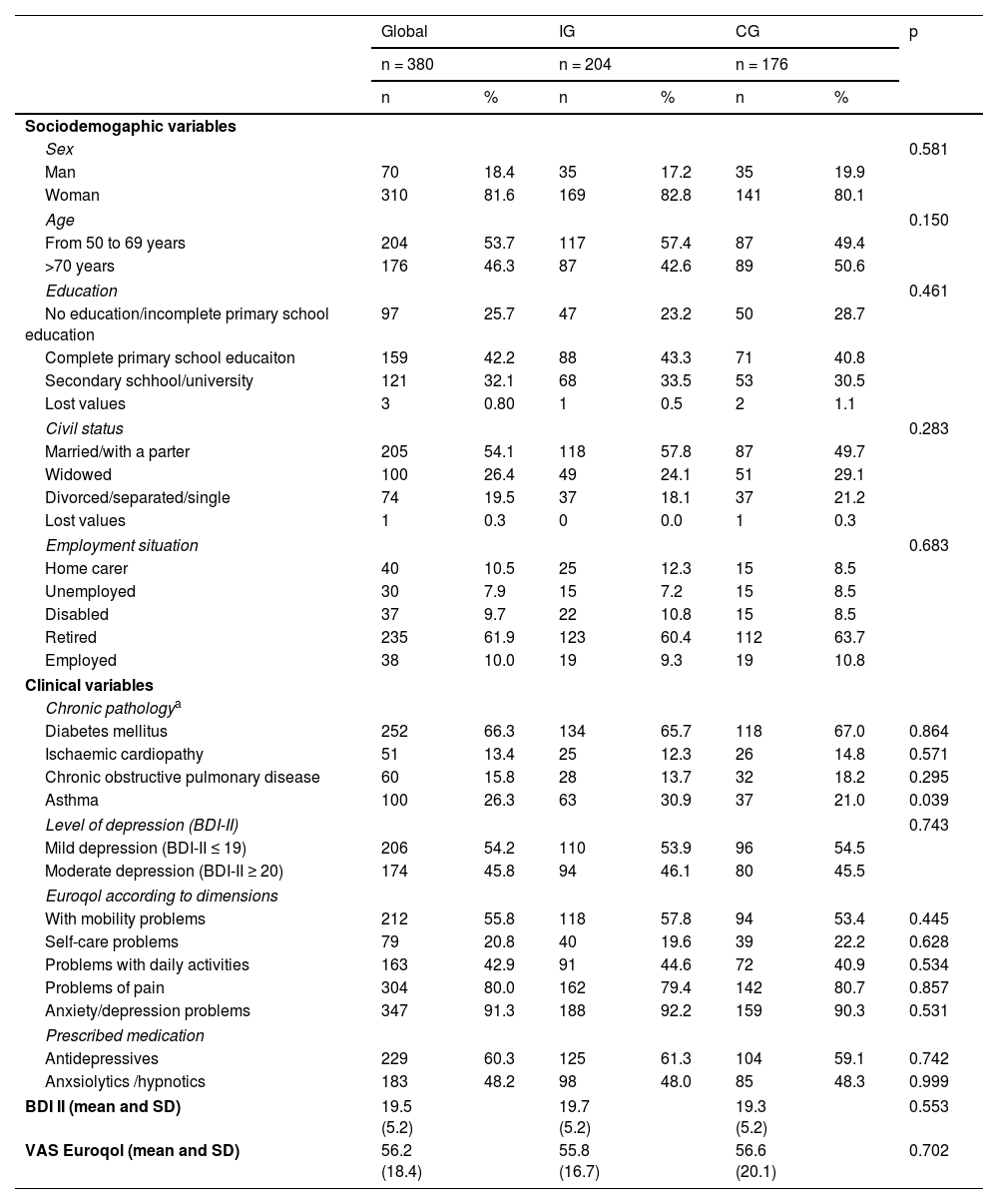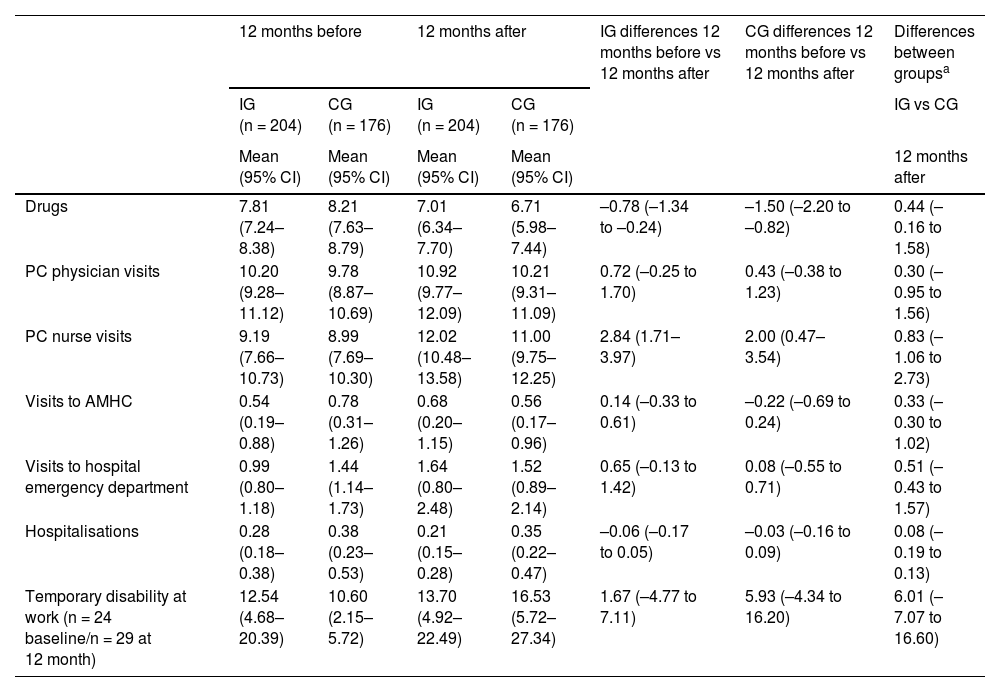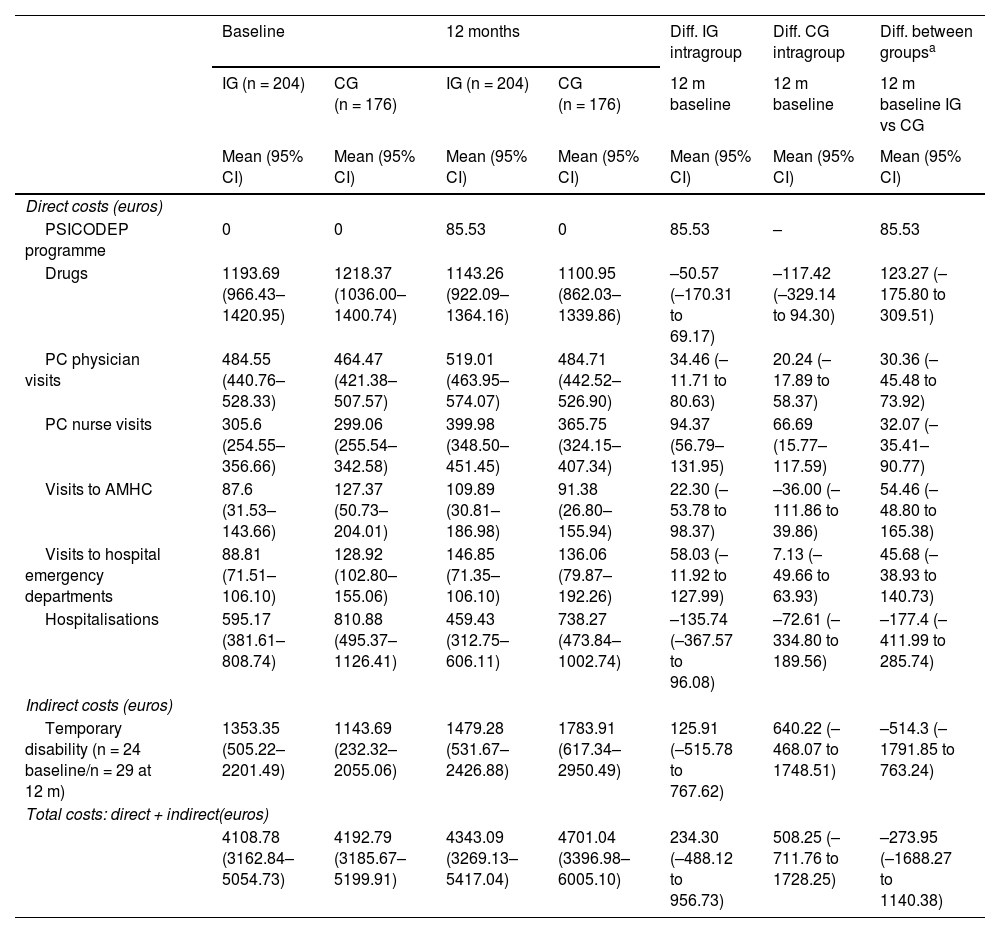To evaluate the cost-effectiveness and cost-utility of a psychoeducational group intervention led by primary care (PC) nurses in relation to customary care to prevent the depression and improve quality of life in patients with physical comorbidity.
DesignEconomic evaluation based on data from randomized, multicenter clinical trial with blind response variables and a one-year follow-up, carried in the context of the PSICODEP study.
Location7 PC teams from Catalonia.
Participants>50 year-old patients with depression and some physical comorbidity: diabetes mellitus type 2, ischemic heart disease, chronic obstructive pulmonary disease, and/or asthma.
Intervention12 psychoeducational group sessions, 1 per week, led by 2 PC nurses with prior training.
MeasurementsEffectiveness: depression-free days (DFD) calculated from the BDI-II and quality-adjusted life years (QALYs) from the Euroqol-5D. Direct costs: PC visits, mental health, emergencies and hospitalizations, drugs. Indirect costs: days of temporary disability (TD). The incremental cost-effectiveness ratios (ICER), cost-effectiveness (ΔCost/ΔDLD) and cost-utility (ΔCost/ΔQALY) were estimated.
ResultsThe study includes 380 patients (intervention group [IG] = 204; control group [CG] = 176). 81.6% women; mean age 68.4 (SD = 8.8). The IG had a higher mean cost of visits, less of hospitalizations and less TD than the CG. The difference in costs between the IG and the CG was −357.95€ (95% CI: −2026.96 to 1311.06) at one year of follow-up. There was a mean of 11.95 (95% CI: −15.98 to 39.88) more DFD in the IG than in the CG. QALYs were similar (difference −0.01, 95% CI −0.04 to 0.05). The ICERs were 29.95€/DLD and 35,795€/QALY.
ConclusionsPsychoeducational intervention is associated with an improvement in DFD, as well as a reduction in costs at 12 months, although not significantly. QALYs were very similar between groups.
Evaluar el coste-efectividad y el coste-utilidad de una intervención grupal psicoeducativa liderada por enfermeras de atención primaria (AP) comparada con la atención habitual para la prevención de la depresión y la mejora de la calidad de vida en pacientes con comorbilidad física.
DiseñoEvaluación económica basada en datos de un ensayo clínico aleatorizado, multicéntrico, con variables respuesta ciegas y seguimiento de un año, realizado en el contexto del estudio PSICODEP.
Emplazamiento27 equipos de AP de Cataluña.
ParticipantesPacientes >50 años con depresión y alguna comorbilidad física: diabetes mellitus tipo 2, cardiopatía isquémica, enfermedad pulmonar crónica y/o asma.
Intervención12 sesiones psicoeducativas grupales, 1/semana, conducidas por 2 enfermeras de AP con formación previa.
MedicionesEfectividad: días libres de depresión (DLD) calculados a partir del BDI-II y años de vida ajustados por calidad (AVAC) a partir del Euroqol-5D-5L. Costes directos: visitas AP, salud mental, urgencias y hospitalizaciones, fármacos. Costes indirectos: días de incapacidad temporal (IT). Se estimó la ratio coste-efectividad incremental (RCEI = ΔCoste/ΔDLD) y la ratio coste-utilidad incremental (RCUI = ΔCoste/ΔAVAC).
ResultadosSe incluyeron 380 pacientes (grupo intervención [GI] = 204; grupo control [GC] = 176). El 81,6% eran mujeres. Media de edad de 68,4 años (DE: 8,8). El GI tuvo más coste medio de visitas, menos de hospitalizaciones y menos días IT que el GC. La diferencia de costes entre el GI y el GC fue de −357,95€ (IC 95%: −2.026,96 a 1.311,06) al año de seguimiento. Hubo una media de 11,95 (IC 95%: −15,98 a 39,88) más DLD en el GI que en el GC. Los AVAC fueron similares (diferencia de −0,01; IC 95%: −0,04 a 0,05). La RCEI y la RCUI fueron de 29,95€/DLD y de 35.795€/AVAC.
ConclusionesLa intervención psicoeducativa se asocia a una mejora de DLD, así como a una reducción de costes a los 12 meses, aunque no de forma significativa. Los AVAC fueron muy similares entre grupos.












